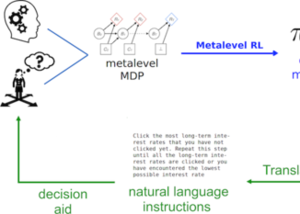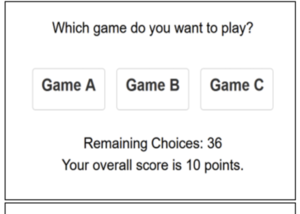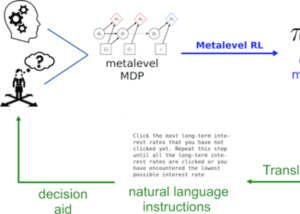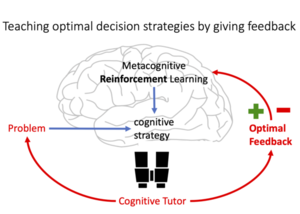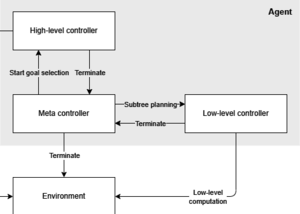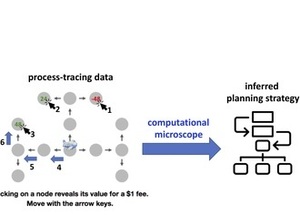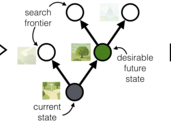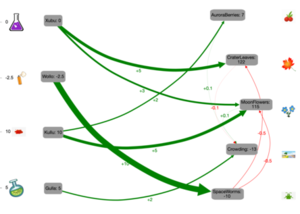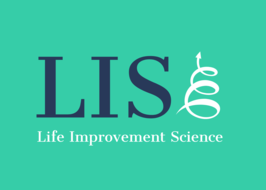Group News
''Boosting human decision-making with AI-generated decision aids” is going to be published!
- 31 July 2022
Our work „Boosting human decision-making with AI-generated decision aids" has been accepted in Computational Brain & Behavior. We extend our interpretability method for automated description of planning strategies and show that it can help people make better, more farsighted decisions. Our findings suggest that AI-powered boosting might have potential for improving human decision-making in the real world.
Our RLDM abstract got accepted!
- 21 March 2022
Our article on ''What to learn next? Aligning gamification rewards to long-term goals using reinforcement learning'' has been accepted at RLDM 2022. Congratulations Reena, Lovis, Victoria, and Falk!
Nowadays, more people can access digital educational resources than ever before. However, access alone is often not sufficient for learners to fulfil their learning goals. To support motivation, learning environments are often gamified, meaning that they offer points for interacting with them. But gamification can add to learners’ tendencies to choose learning activities in a short-sighted manner. An example for a short-sighted choice bias is the preference for an easy task offering a quick sense of accomplishment (and in gamified environments often a quick accumulation of points) over a harder task offering to make real progress. The concept of optimal brain points demonstrates that methods from the field of reinforcement learning, specifically reward shaping, allow us to align short-term rewards for learning choices with their expected long-term benefit in a learning context. Building on that work, we here present a scalable approach to supporting self-directed learning in digital learning environments applicable to real-world educational games. It can motivate learners to choose the learning activities that are most beneficial for them in the long run. This is achieved by incentivizing each learning activity in a way that reflects how much progress can be made by completing it and how thatprogress relates to their learning goal. Specifically, the approach entails modelling how learners choose between learning activities as a Markov Decision Process and applying methods from reinforcement learning to compute which learning choices optimize the learners progress based on their current knowledge. We specify how our developed method can be applied to the English-learning App “Dawn of Civilisation”. We further present the first evaluation of the approach in a controlled online experiment with a simplified learning task, which showed that the derived incentives can significantly improve both learners’ choice behaviour and their learning outcomes.
New article on AI-powered boosting
- 15 March 2022
Our work „Boosting human decision-making with AI-generated decision aids" is now available on Arvix. We extend our method for automated discovery and description of planning strategies via #XRL, and show that it can help people make better, more farsighted decisions.
Leveraging Artificial Intelligence to Improve People's Planning Strategies
- 01 February 2022
Our article on improving human decision-making with intelligent cognitive tutors has been accepted for publication in PNAS.
Many bad decisions and their devastating consequences could be avoided if people used optimal decision strategies. Here, we introduce a new approach to improving human decision-making. The basic idea is to give people feedback on \textit{how} they reach their decisions. We develop a method that leverages artificial intelligence to generate this feedback in such a way that people quickly discover the best possible decision strategies. Our empirical findings suggest that this new approach leads to improvements in decision-making competence that transfer to more difficult decisions in more complex environments. In the long run, this line of work might lead to apps that teach people clever strategies for decision making, reasoning, goal-setting, planning, and goal achievement.
"Improving Human Decision-Making by Discovering Efficient Strategies for Hierarchical Planning" is going to be published!
- 25 January 2022
The article "Improving Human Decision-Making by Discovering Efficient Strategies for Hierarchical Planning" has been accepted in Computational Brain & Behavior.
Saksham Consul Lovis Heindrich Jugoslav Stojcheski Falk Lieder
New Methods Paper
- 03 January 2022
Our methods paper "A Computational Process-Tracing Method for Measuring People’s Planning Strategies and How They Change Over Time" has just been accepted for publication in Behavior Research Methods.
Article on Resouce-Rational Models of Planning Accepted by Nature Human Behaviour
- 23 December 2021
The article "Rational Use of Cognitive Resources in Human Planning" has been accepted for publication in Nature Human Behaviour.
"Resource-Rational Models of Human Goal Pursuit" is now published!
- 26 August 2021
Great work Ben, Florian, Mateo, and Falk!
The Life Improvement Science 2021 inaugural conference concluded successfully on 13 June, 2021!
- 01 July 2021
Life Improvement Science (LIS) is an emerging transdisciplinary research field that investigates how we can help people do more good in better ways (well-doing).
The ultimate goal of the conference was to promote the long-term well-doing of humanity. The conference featured invited talks on the most promising scientific approaches from motivation science, moral psychology, positive psychology, cognitive science, effective altruism, digital interventions, character education, social and personality psychology, coaching, wisdom scholarship, economics, sociology, and other relevant areas from some of the key researchers in these fields. We had more than 600 registered participants and we successfully gathered 100+ researchers to join the community after the conference and they will collaborate on the topic LIS in the future.
ICCM accepts paper on measuring and modelling how people learn how to plan!
- 24 June 2021
Great work Ruiqi, Yash, and Falk!

